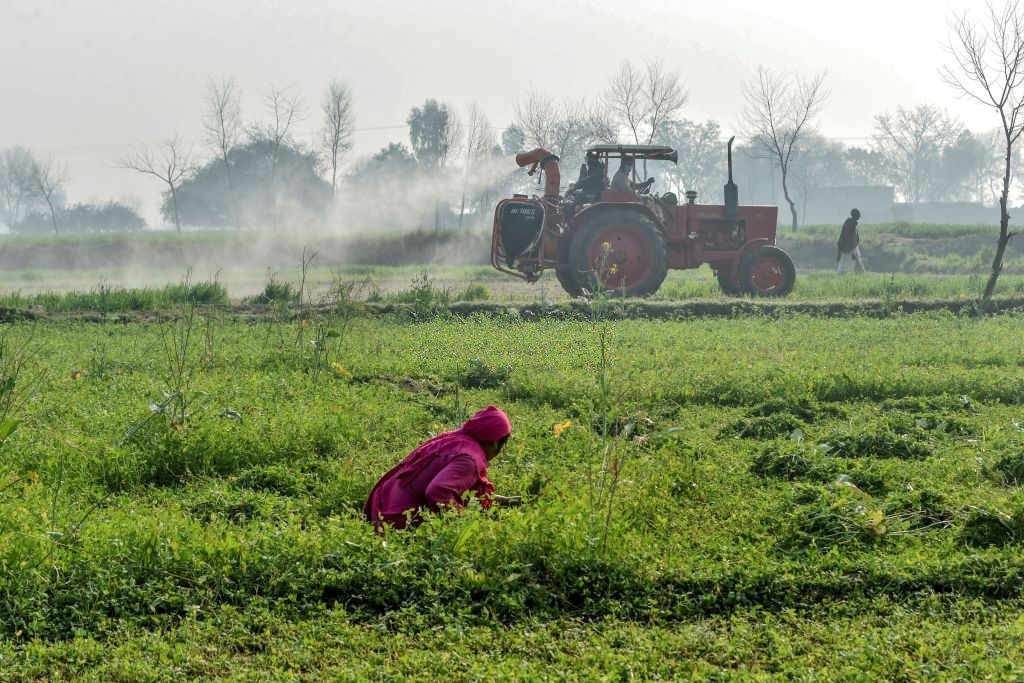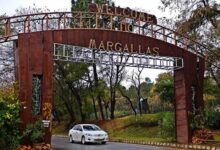Challenges Faced by Farmers in Punjab’s Kissan Card Initiative
Implementation hurdles, including political instability and technical issues, impacting the effectiveness of the program.

Zia_ul_haq started his agriculture business two years ago in 78_5/R a small village in District Sahiwal of Punjab after he returned from Bahrain. He also signed up for the Kissan card, a new initiative to support farmers, upgrade their skills and boost productivity in Pakistan.
“I found the incentives announced really appealing since Kissan (the local term for farmers) are facing issues regarding seeds, fertilizer and purchasing diesel,” he said.
“But when I visited the fertilizer dealer to get a subsidy through my Kissan card, my biometric failed.”
Former Prime Minister Imran Khan, after assuming charge of his office in 2021, had introduced a Rs. 300 billion program to boost agricultural productivity and improve financial condition of the farmers by upgrading agriculture infrastructure and reducing input cost.
This mega program was aimed to provide different facilities to farmers who registered for the Kissan card, especially financial support, following a transparent mechanism.
According to official figures there are approximately five million Kissan in Punjab and the registered farmers for the Kissan card according to the official website of Pakistan Information and Technology Board (PITB) are 1.28 million and the figures Punjab government shows that 2.5 million Kissan are registered in Kissan card.
“Issuance of Kissan Card would help remove hiccups in extending financial assistance to farmers by freeing them from multi-step verification,” said Saqeeb Ateel, the Secretary of Agriculture in South Punjab, at the inauguration ceremony a little over a year ago. “It is highly valuable intervention for the farmers who will also be facilitated with financial assistance through this card.”
The Kissan card was initiated to bring in transparency and brisk transferring of subsidies to deserving farmers in a single step, and aimed at providing the following:
- “Subsidies for seeds and pesticides
- Support to farmers through money in moments of calamity and crisis.
- Protection to all of Pakistan’s four to five million farmers and will create ease for them by provide things at lower prices
According to Punjab agriculture department, Punjab, the most populated province of Pakistan, provides the largest share in national agricultural production. Agriculture offers 19% of the GDP and gives employment to 48% of the population of Pakistan. It contributes raw materials to major industries; textile, leather, rice processing, edible oil, sugar and various food processing industries.
Pakistan’s total exports have a three fourth share of agriculture and 60% of this share comes from Punjab. Over the years, the demand from Punjab has been high and farmers have tried to work around challenges of food security and supply chain disruptions amid climate-related disasters, such as the devastating floods in 2022 that destroyed many crops and killed many people.
Punjab is also the second largest province contributing 25.9% of the country’s total land, with an area of 20.63 million hectares. Land utilization status is accessible for 86% of the aggregate territory, while 14% land stays unreported. Another 14% of the area is not available for agriculture because it is either totally fertile or occupied by infrastructure, resulting in 72% of cultivable land. Also, 10.81 million hectares (53%) is a net sown area, which is cultivated at least once a year. 9% of the land is categorized as current fallow, an area that is not used for cultivation during a year. 8% land is marked as cultivable waste which means an area that is not cultivated for more than three years and is a part of cultivated area.
Census of agriculture 2016-17 shows that there were 5,249,800 agriculture farms in Punjab, mostly very small farms. About 42% of the farms are even less than one hector. Farms ranging from one hectare to 10 hectares make up half of the total number of farms and they occupy 68.9 % of the total area. Farms consisting of 10 hectares and above are 22.2% of the total farm area.
Muzaffar Hussain has been farming for the past forty years in a village 78_ 5/R in Sahiwal, Punjab. He cultivates wheat, rice and maize on his ten acres of land.
He says that over time, the changing environment and inflation have adversely affected crops and their production. The amount the zamindar (Farmer) spends on the crop does not give him that much benefit in return. Another major reason is non-availability of fertilizer or expensive fertilizer and the quality of seed health is also falling. Hussain added more.
MULTI-STEP AND CONFUSING REGISTRATION NEXUS
While the Kissan card initiative excited most farmers, bureaucracy and digital hiccups came their way.
To provide financial support, the PTI government signed an agreement with Habib Bank Limited (HBL) . For registration process, farmers had to visit the agriculture department in their area and get the registration form. After submitting the form, they have to visit HBL branch in their area and get their biometric by paying 500 rupees as registration fee. By following this process, their data is fed in the Punjab Information Technology Board (PITB) team, and after a specific time, they get a call from the agriculture department to get their Kissan card from the Agriculture department in their District.
Samavia shahid, cotton inspector in agriculture department Sahiwal, holding the additional charge of supervision on Kissan card said they have lodged a number of complaints from farmers regarding the rude and non_Co-operative behavior of Habib Bank staff.
When HBL Bank was contacted, a staff member confirmed their role in facilitating Kissan Cards but farmers were required to connect with agents assigned by the bank. None of the farmers knew where to find the agents.
Branch manager Waqas from Sadar branch of HBL Sahiwal, suggested another branch of HBL at Pakpatan Road Sahiwal. The zonal manager, Zeeshan, too confirmed that the branch does Kissan card registrations. Upon reaching the said branch, however, the staff said they undertake no such registrations.
“Just imagine that if 2.5 million Kissan get registered in Kissan card, so HBL has earned 120 million rupees till dated.” Zia_ul_haq – Farmer
Zeeshan brushed further information, declining to provide any data, and said his zone staff was busy with the distribution of Benazir income support programme money in Sahiwal division.
“I do not have the numbers of bio metric machines we had distributed in Sahiwal yet and we even cannot give any accurate number of registered Kissans with us too,” said”, Rao Naveed, the cluster manager of HBL kconnect responded.
Naveed was also not sure about the amount of fees that farmers have to pay for the renewal of their cards nor the location.
LACK OF TRUST IN THE SUPPLY CHAIN’
Muhammad Kashif is a resident of 82/6 R, a small village in Punjab. He did not register himself for the Kissan card. He believes that it is just a fake announcement from the government.
“Kissan is the most neglected person in our country, from my childhood till now I never saw any support from the government for Kissan,” Kashif told “DAWN”.
“My father was also a farmer; I saw him suffering because of low quality pesticides, high rate of fertilizers, and unavailability of diesel but never witnessed any help from the local agriculture department, so I do not trust any of these initiatives from the government.”

Husain, the farmer from Sahiwal village said he wasn’t allowed for extra subsidies within a year.
“When I visited a fertilizer dealer’s store to purchase fertilizer for my winter crop after getting subside for the summer crop, the dealer gives this excuse to me and did not give me subsidy second time, Hussain further added.
Muhammad Abbas, owner of Waqas traders, a fertilizer store in Punjab, said HBL Bank had taken back their biometric machines and no dealer is giving any subsidy now.
“A coupon’s life is of six months and now all the coupon in the fertilizer bags are expired, “said Abbas. “This is a very complexed mechanism, we are told to provide subsidy to the farmers holding Kissan card on each bag of the DAP fertilizer and they limit it on ten bags. But government advertises that they will provide subsidies on seeds and Pesticides, But it is not true.” Abbas added more.
COMPUTERS, DIGITIZATION AND POLITICS
Maqsood Ahmad, Deputy Director of agriculture department (Extension) Sahiwal, stated that the biggest benefit of Kissan card till date is that we have at least a computerized data of registered farmers.
“We tried to reach at the doors of Kissan to help them, inform them and facilitate them regarding Kissan card and its benefits, and the agents of agriculture department are in touch with the farmers of their areas through phone calls and WhatsApp,” said Ahmad. “Our agents often visit their assigned area to reach to the Kissan to know their problems and facilitate them.”
He maintained that subsidies were available for farmers but the political instability in Punjab had badly hit this initiative. He said, after the new government run by the Pakistan Muslim League took over in July 2022, they immediately disabled this program in Punjab, and that shook farmers’ trust.

Ahmad said registrations need to be done using thumb impressions and many farmers have lost their impression markings over the years.
“When government announced this initiative We, with our team along with HBL staff, did door to door campaign to help them get registered but no internet and slow internet connection was another big issue in these areas, even we cannot connect with them because of the connectivity issues,” Ahmad further added.
Syed Naeem Safdar Shah owns a land of fifteen acres and has registered himself in the Kissan card initiative. He focused on tunnel crops and growing summer vegetables in tunnel in winter season. For him this gives him good returns instead of wheat or rice.
Talking about the Kissan card, Naeem stated that he used this card and get subsidy on DAP but only one time as according to him on his second visit they refuse to entertain him on Kissan card. Naeem find it a good initiative until Government have full control and check and balance on it. He believes that Kissan card is just like a fairy tale till now.
“While the Kissan Card aims to provide subsidies and support, its implementation has been marred by confusion and inefficiency, leaving many farmers disillusioned.” Muhammad Abbas, owner of Waqas Traders, a fertilizer store.
Naeem also need some spray for his tunnel crop but kissan card is not giving any subsidy on these sprays . This is a good initiative, there are many gaps which takes time to fill the gap. Kissan are uneducated, they cannot use technology and even use mobiles to reach the facilities. Naeem believes.
“Habib bank limited take fee of 500 to get registered in kisan card and the government advertisements shows that this is a refundable amount but this card is valid till one year and now I have to reactive this card by paying another amount of 500. What about the 500 which I paid at first?” said Zia ul haq.
“Just imagine that if 2.5 million Kissan get registered in Kissan card, so HBL has earned 120 million rupees till dated and the number of Kissan who paid renewal fees, digits are still hidden. The biggest question is who the biggest beneficiary of this initiative. Kissan or HBL?” Zia further added.
Abdul Kareem and Brothers is a fertilizer store, and this store is affiliated with agriculture department for the subside. Kareem said that HBL have taken back their biometric machine from us. They did not give any specific reason about this, and the agriculture department also never informs us yet that if the initiative is on. Kareem further added that at first when HBL provide us biometric machines they ask for the 15k of money as security. They have given that money back but Now we heard that they are going to demand of 2lac for each machines . I guess number of dealers except the bigger one will refuse to pay this amount.
Maqsood highlighted that number of cards we receive in agriculture department are still in the office because after receiving the Kissan we have made calls to the relevant person to collect his card but unfortunately number of Kissan do not visit to collect their cards so these cards are of no use.
Another issue faced by the farmers is the process to activate this Kissan card and it is exactly like the ATM card and number of farmers can not follow this process, Maqsood further added.
The agents of the agriculture department visited our village 78/5R after the announcement of kissan card to give awareness regarding this card . Farmers especially the small Farmer are not that educated so it takes a lot time to convince them that this could be a helping hand for us, Muzaffar further added.
Disclaimer: this article was published I’m DAWN EOS in 2023 . The Reporters is publishing this with addition of its censored parts.




